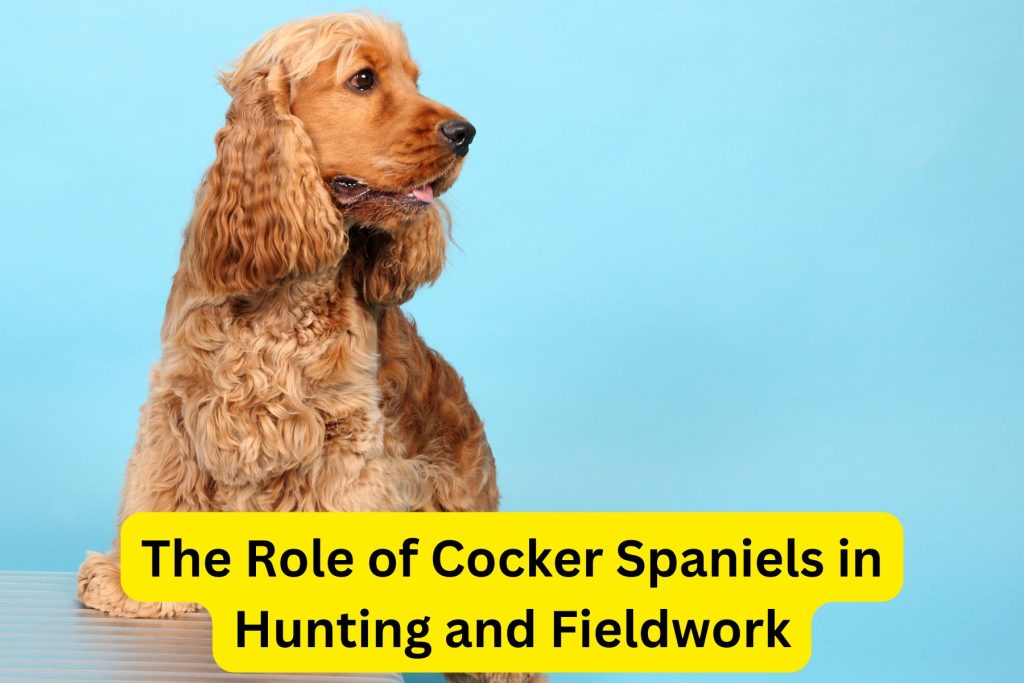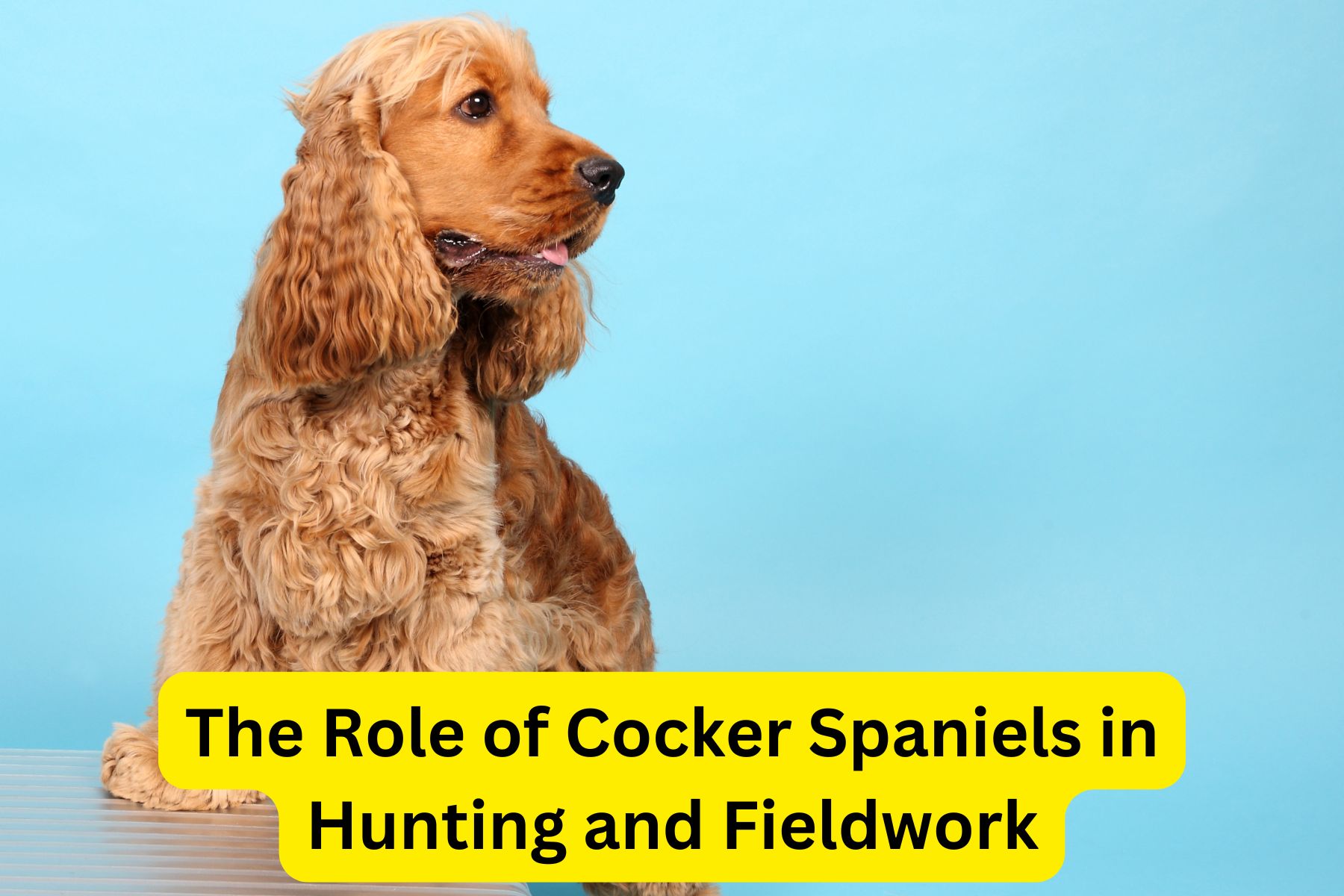Cocker Spaniels, renowned for their silky coats and affectionate nature, hold a distinguished place in the history of hunting and fieldwork. Originally bred as sporting dogs, they have been invaluable companions to hunters for centuries. Their agility, keen sense of smell, and trainability make them one of the most versatile and efficient breeds for fieldwork.

In this article, we will explore the historical roots of Cocker Spaniels as hunting dogs, their unique traits, how they excel in the field, and why they remain a top choice for hunters today.
Historical Background: Cocker Spaniels as Hunting Dogs
Cocker Spaniels originated in Spain and were primarily bred for hunting small game, particularly woodcock birds—hence the name “Cocker.” These dogs became popular in England during the 14th century and were later categorized into different types based on their size and purpose.
The breed’s natural ability to flush out birds and retrieve them after a shot made them indispensable to hunters. By the 19th century, two distinct types of Cocker Spaniels had emerged:
- American Cocker Spaniels: Smaller in size and primarily bred for companionship and show.
- English Cocker Spaniels: Slightly larger and retaining their robust hunting instincts.
Physical Traits That Aid in Hunting
Cocker Spaniels possess several physical characteristics that make them adept at hunting and fieldwork:
1. Compact Build
Their medium size allows them to navigate dense undergrowth and tight spaces with ease, making them ideal for flushing game from thickets.
2. Stamina and Agility
Cocker Spaniels are energetic dogs with exceptional stamina. Their athletic build allows them to cover long distances and adapt to various terrains, including forests, marshes, and open fields.
3. Acute Sense of Smell
Cocker Spaniels have an extraordinary olfactory sense, which enables them to locate hidden game even in challenging environments. This trait is particularly valuable for tracking wounded birds or animals.
4. Water-Resistant Coat
Their silky, slightly wavy coat is not just beautiful but also functional. It provides some resistance to water and helps them stay warm in damp conditions, making them excellent swimmers for retrieving game from water bodies.
The Role of Cocker Spaniels in Modern Hunting
While their hunting roots date back centuries, Cocker Spaniels continue to excel in modern hunting scenarios. Their roles include:
1. Flushing Game
One of the primary tasks for which Cocker Spaniels are known is flushing game out of hiding. Their quick movements and focused determination allow them to drive birds or small animals out of bushes or tall grass, making them easy targets for hunters.
2. Retrieving Game
After the shot, Cocker Spaniels demonstrate their retrieving skills by locating and bringing back the game without causing damage. Their soft mouths are especially useful for retrieving birds like pheasants or ducks.
3. Tracking Wounded Game
Cocker Spaniels’ keen sense of smell is invaluable for tracking wounded animals, ensuring that no game is left behind.
4. Versatility Across Terrains
From upland game hunting in forests and fields to waterfowl hunting near lakes and marshes, Cocker Spaniels adapt to various terrains and game types, showcasing their unmatched versatility.
Training Cocker Spaniels for Hunting and Fieldwork
1. Start Early
Training should begin when the dog is a puppy, ideally around 8–12 weeks old. Early exposure to different environments and scents lays the foundation for their hunting skills.
2. Basic Obedience Training
Commands like “sit,” “stay,” “come,” and “heel” are essential before moving on to field-specific training. These commands ensure safety and control during hunting sessions.
3. Introduce Hunting Scenarios Gradually
Gradual exposure to hunting scenarios, such as introducing the sound of gunfire and working with game birds, helps them acclimate without fear or anxiety.
4. Scent Training
Scent training involves teaching the dog to identify and follow specific scents. This can be done using scented dummies or real game feathers.
5. Retrieval Practice
Cocker Spaniels excel in retrieving, but this skill needs refinement. Practice with dummies or training birds to ensure they retrieve without damaging the game.
6. Positive Reinforcement
Reward-based training methods work best for Cocker Spaniels, as they are eager to please. Treats, praise, and playtime help reinforce desired behaviors.
Why Cocker Spaniels Stand Out in Fieldwork
Cocker Spaniels are not the only dogs used for hunting, but they possess several traits that set them apart:
1. Intelligence and Trainability
These dogs are quick learners and respond well to training, making them easier to prepare for complex tasks in the field.
2. Gentle Temperament
Their friendly and gentle demeanor ensures they can work closely with hunters and other dogs without aggression.
3. Adaptability
Cocker Spaniels can adapt to different hunting styles and environments, whether it’s flushing game in dense forests or retrieving ducks from water.
4. Unwavering Loyalty
Cocker Spaniels form strong bonds with their handlers, making them reliable companions during long hunting trips.
Challenges of Using Cocker Spaniels for Hunting
While Cocker Spaniels excel in hunting, there are some challenges to consider:
1. High Energy Levels
Their energy needs to be managed with regular exercise and mental stimulation to prevent boredom and behavioral issues.
2. Grooming Requirements
Their long, silky coats can pick up burrs, twigs, and dirt during fieldwork, necessitating regular grooming and maintenance.
3. Prone to Ear Infections
Their floppy ears are susceptible to infections, especially after exposure to water or debris during hunting sessions.
Famous Cocker Spaniels in Fieldwork
Over the years, many Cocker Spaniels have made a name for themselves in the world of hunting and field trials. Their success in these competitions highlights their skill, intelligence, and versatility.
One such example is Ch. My Own Brucie, an American Cocker Spaniel who not only excelled in the show ring but also demonstrated exceptional fieldwork abilities.
How to Choose a Hunting Cocker Spaniel
If you’re considering a Cocker Spaniel for hunting, here are some tips:
- Look for Field-Bred Lines:
Field-bred Cocker Spaniels often have a stronger prey drive and better stamina compared to show-bred lines. - Evaluate Temperament:
Choose a pup with a confident and curious temperament, as these traits are crucial for hunting. - Check Pedigree:
A well-documented pedigree with hunting champions in the lineage can be a good indicator of potential. - Health Screening:
Ensure the pup comes from a breeder who tests for common health issues, such as hip dysplasia and eye conditions.
The Future of Cocker Spaniels in Hunting
As the demand for versatile hunting dogs grows, Cocker Spaniels are poised to remain a popular choice among hunters. Their unique combination of intelligence, agility, and adaptability ensures they can continue excelling in various fieldwork roles.
Moreover, advancements in training techniques and breeding practices will likely enhance their abilities even further, cementing their place as one of the most cherished breeds in the hunting world.
Conclusion
Cocker Spaniels have carved a niche for themselves in the realm of hunting and fieldwork. Their rich history, physical prowess, and unmatched versatility make them exceptional hunting companions. Whether flushing game, retrieving, or tracking, these dogs bring unparalleled skill and dedication to the field.
For hunters seeking a loyal, intelligent, and adaptable partner, the Cocker Spaniel remains a top contender. With proper training, care, and appreciation of their natural talents, these dogs will continue to shine in hunting and beyond.
Have you hunted with a Cocker Spaniel? Share your experiences in the comments below. We’d love to hear how these remarkable dogs have contributed to your fieldwork adventures!
